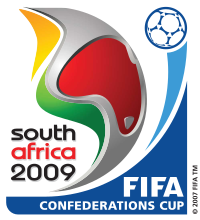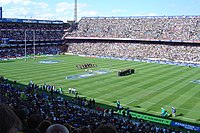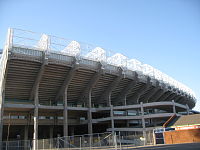The 2009 FIFA Confederations Cup was the eighth Confederations Cup, and was held in South Africa from 14 June to 28 June 2009, as a prelude to the 2010 FIFA World Cup. The draw was held on 22 November 2008 at the Sandton Convention Centre in Johannesburg. The opening match and the final was played at Ellis Park Stadium in Johannesburg. The tournament was won by Brazil, who retained the trophy they won in 2005 by defeating the United States 3–2 in the final.
| FIFA Sokker-Konfederasiebeker in 2009 | |
|---|---|
 | |
| Tournament details | |
| Host country | South Africa |
| Dates | 14–28 June |
| Teams | 8 (from 6 confederations) |
| Venue(s) | 4 (in 4 host cities) |
| Final positions | |
| Champions | |
| Runners-up | |
| Third place | |
| Fourth place | |
| Tournament statistics | |
| Matches played | 16 |
| Goals scored | 44 (2.75 per match) |
| Attendance | 584,894 (36,556 per match) |
| Top scorer(s) | |
| Best player(s) | |
| Best goalkeeper | |
| Fair play award | |
Qualified teams

| Team | Confederation | Qualification method | Date qualification secured | Participation no. |
|---|---|---|---|---|
 South Africa South Africa | CAF | Hosts | 15 May 2004 | 2nd |
 Italy Italy | UEFA | 2006 FIFA World Cup winners | 9 July 2006 | 1st |
 United States United States | CONCACAF | 2007 CONCACAF Gold Cup winners | 24 June 2007 | 4th |
 Brazil Brazil | CONMEBOL | 2007 Copa América winners | 15 July 2007 | 6th |
 Iraq Iraq | AFC | 2007 AFC Asian Cup winners | 29 July 2007 | 1st |
 Egypt Egypt | CAF | 2008 Africa Cup of Nations winners | 10 February 2008 | 2nd |
 Spain Spain | UEFA | UEFA Euro 2008 winners | 29 June 2008 | 1st |
 New Zealand New Zealand | OFC | 2008 OFC Nations Cup winners | 19 November 2008 | 3rd |
Draw
The draw for the competition was held on 22 November 2008 at the Sandton Convention Centre in Johannesburg.[1] Each team was represented in the draw by its competitor in the Miss World 2008 competition, except for Iraq, which was represented by Miss World 2007, Zhang Zilin, from China. The teams were divided into two pots:[2]
- Pot A: South Africa (automatically placed as Team A1), Brazil, Italy, Spain
- Pot B: Egypt, Iraq, New Zealand, United States
Teams from the same confederation were not drawn into the same group, therefore Egypt was drawn into Group B. Also as result, Italy and Spain were drawn into different groups.[3][4][5]
Match ball

The official match ball for the 2009 FIFA Confederations Cup was the Adidas Kopanya. The name means "bring (or join) together" in Southern Sesotho, one of the 11 official languages of South Africa. The panel configuration of the ball is the same as that of the Teamgeist and Europass balls that came before it. The ball is white, accentuated with bold black lines and detailed with typical Ndebele designs in red, yellow, green and blue.[6]
Venues
Four cities served as the venues for the 2009 FIFA Confederations Cup.[7] All four venues were also used for the 2010 FIFA World Cup.
| Johannesburg | Pretoria | ||
|---|---|---|---|
| Ellis Park Stadium | Loftus Versfeld Stadium | ||
| Capacity: 62,567 | Capacity: 50,000 | ||
 |  | ||
| Bloemfontein | Rustenburg | ||
| Free State Stadium | Royal Bafokeng Stadium | ||
| Capacity: 48,000 | Capacity: 42,000 | ||
 |  | ||
Originally, Nelson Mandela Bay Stadium in Port Elizabeth was also chosen as a venue. On 8 July 2008, however, Port Elizabeth withdrew as a host city because its stadium was deemed unlikely to meet the 30 March 2009 deadline for completion.[8] The Nelson Mandela Bay stadium was subsequently completed before the Confederations Cup and was opened on 7 June 2009. It acted as a venue for the 2009 British & Irish Lions tour to South Africa on 16 June. All of these stadia hosted matches during the Lions tour, but a minimum of nine days was allowed for pitch recovery between a rugby match and a Confederations Cup match.
Match officials
The referees were announced on 5 May.[9] Two referee teams (led by Carlos Batres and Carlos Amarilla respectively) withdrew due to injuries. Replacements from the same confederation, led by Benito Archundia and Pablo Pozo, were selected.[10]
| Confederation | Referee | Assistants |
|---|---|---|
| AFC | Matthew Breeze (Australia) | Matthew Cream (Australia) Ben Wilson (Australia) |
| CAF | Coffi Codjia (Benin) | Komi Konyoh (Togo) Alexis Fassinou (Benin) |
| CONCACAF | Benito Archundia (Mexico) | Marvin Torrentera (Mexico) Héctor Vergara (Canada) |
| CONMEBOL | Pablo Pozo (Chile) | Patricio Basualto (Chile) Francisco Mondria (Chile) |
| Jorge Larrionda (Uruguay) | Pablo Fandiño (Uruguay) Mauricio Espinosa (Uruguay) | |
| OFC | Michael Hester (New Zealand) | Jan Hendrik-Hintz (New Zealand) Mark Rule (New Zealand) |
| UEFA | Howard Webb (England) | Peter Kirkup (England) Mike Mullarkey (England) |
| Martin Hansson (Sweden) | Henrik Andrén (Sweden) Fredrik Nilsson (Sweden) | |
| Massimo Busacca (Switzerland) | Matthias Arnet (Switzerland) Francisco Buragina (Switzerland) |
Squads
Group stage
- Tie-breaking criteria
The ranking of each team in each group was determined as follows:[11]
- Greatest number of points obtained in all group matches;
- Goal difference in all group matches;
- Greatest number of goals scored in all group matches.
Had two or more teams been equal on the basis of the above three criteria, their rankings would have been determined as follows:
- Greatest number of points obtained in the group matches between the teams concerned;
- Goal difference resulting from the group matches between the teams concerned;
- Greater number of goals scored in all group matches between the teams concerned;
- Drawing of lots by the FIFA Organising Committee.
Group A
| Pos | Team | Pld | W | D | L | GF | GA | GD | Pts | Qualification |
|---|---|---|---|---|---|---|---|---|---|---|
| 1 |  Spain Spain | 3 | 3 | 0 | 0 | 8 | 0 | +8 | 9 | Advance to knockout stage |
| 2 |  South Africa (H) South Africa (H) | 3 | 1 | 1 | 1 | 2 | 2 | 0 | 4 | |
| 3 |  Iraq Iraq | 3 | 0 | 2 | 1 | 0 | 1 | −1 | 2 | |
| 4 |  New Zealand New Zealand | 3 | 0 | 1 | 2 | 0 | 7 | −7 | 1 |
South Africa  | 2–0 |  New Zealand New Zealand |
|---|---|---|
| Report |
Group B
| Pos | Team | Pld | W | D | L | GF | GA | GD | Pts | |
|---|---|---|---|---|---|---|---|---|---|---|
| 1 |  Brazil Brazil | 3 | 3 | 0 | 0 | 10 | 3 | +7 | 9 | Advance to knockout stage |
| 2 |  United States United States | 3 | 1 | 0 | 2 | 4 | 6 | −2 | 3 | |
| 3 |  Italy Italy | 3 | 1 | 0 | 2 | 3 | 5 | −2 | 3 | |
| 4 |  Egypt Egypt | 3 | 1 | 0 | 2 | 4 | 7 | −3 | 3 |
United States  | 0–3 |  Brazil Brazil |
|---|---|---|
| Report |
|
Knockout stage
| Semi-finals | Final | |||||
| 24 June – Bloemfontein | ||||||
 Spain Spain | 0 | |||||
| 28 June – Johannesburg | ||||||
 United States United States | 2 | |||||
 United States United States | 2 | |||||
| 25 June – Johannesburg | ||||||
 Brazil Brazil | 3 | |||||
 Brazil Brazil | 1 | |||||
 South Africa South Africa | 0 | |||||
| Third place | ||||||
| 28 June – Rustenburg | ||||||
 Spain (aet) Spain (aet) | 3 | |||||
 South Africa South Africa | 2 | |||||
Semi-finals
Match for third place
Final
United States  | 2–3 |  Brazil Brazil |
|---|---|---|
Dempsey  10' 10'Donovan  27' 27' | Report | Luís Fabiano  46', 74' 46', 74'Lúcio  84' 84' |
Awards
| Golden Ball | Golden Shoe |
|---|---|
 Kaká Kaká |  Luís Fabiano Luís Fabiano |
| Silver Ball | Silver Shoe |
 Luís Fabiano Luís Fabiano |  Fernando Torres Fernando Torres |
| Bronze Ball | Bronze Shoe |
 Clint Dempsey Clint Dempsey |  David Villa David Villa |
| Golden Glove | FIFA Fair Play Trophy |
 Tim Howard Tim Howard |  Brazil Brazil |
| Goalkeeper | Defenders | Midfielders | Forwards |
|---|---|---|---|
Statistics
Goalscorers
Luís Fabiano received the Golden Shoe award for scoring five goals. In total, 44 goals were scored by 27 different players, with only one of them credited as own goal.
- 5 goals
- 3 goals
- 2 goals
- 1 goal
- Own goal
 Andrea Dossena (against Brazil)
Andrea Dossena (against Brazil)
Tournament ranking
Per statistical convention in football, matches decided in extra time are counted as wins and losses, while matches decided by penalty shoot-outs are counted as draws.
| Pos | Grp | Team | Pld | W | D | L | GF | GA | GD | Pts | Final result |
|---|---|---|---|---|---|---|---|---|---|---|---|
| 1 | B |  Brazil Brazil | 5 | 5 | 0 | 0 | 14 | 5 | +9 | 15 | Champions |
| 2 | B |  United States United States | 5 | 2 | 0 | 3 | 8 | 9 | −1 | 6 | Runners-up |
| 3 | A |  Spain Spain | 5 | 4 | 0 | 1 | 11 | 4 | +7 | 12 | Third place |
| 4 | A |  South Africa (H) South Africa (H) | 5 | 1 | 1 | 3 | 4 | 6 | −2 | 4 | Fourth place |
| 5 | B |  Italy Italy | 3 | 1 | 0 | 2 | 3 | 5 | −2 | 3 | Eliminated in group stage |
| 6 | B |  Egypt Egypt | 3 | 1 | 0 | 2 | 4 | 7 | −3 | 3 | |
| 7 | A |  Iraq Iraq | 3 | 0 | 2 | 1 | 0 | 1 | −1 | 2 | |
| 8 | A |  New Zealand New Zealand | 3 | 0 | 1 | 2 | 0 | 7 | −7 | 1 |
See also
References
External links


